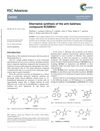 16 citations,
July 2002 in “JOGC/Journal of obstetrics and gynaecology Canada”
16 citations,
July 2002 in “JOGC/Journal of obstetrics and gynaecology Canada” Birth control pills can help reduce mild to moderate acne in women.
 June 2013 in “Vestnik dermatologii i venerologii”
June 2013 in “Vestnik dermatologii i venerologii” Women with hair thinning have disrupted steroid hormone levels, but this doesn't often show as other health issues. More research is needed on hormone balance in this condition.
 June 2021 in “Pharmaceutical sciences”
June 2021 in “Pharmaceutical sciences” Flutamide emulgel with 1% Transcutol P absorbs better through the skin than other mixtures.
[object Object]  9 citations,
January 1997 in “Gynecological Endocrinology”
9 citations,
January 1997 in “Gynecological Endocrinology” The document concludes that treating androgen excess needs patience, managing expectations is important, and many drugs used are not officially approved, suggesting cosmetic options for mild cases.
 September 2024 in “Journal of Cutaneous and Aesthetic Surgery”
September 2024 in “Journal of Cutaneous and Aesthetic Surgery” Bicalutamide may help treat female pattern hair loss.
 3 citations,
September 2016 in “Natural Product Communications”
3 citations,
September 2016 in “Natural Product Communications” Germacrene analogs, especially 8-Hydroxy germacrene B, are more effective than germacrone at blocking a hormone-related enzyme and could help treat hair loss.
 72 citations,
January 2003 in “American Journal of Pathology”
72 citations,
January 2003 in “American Journal of Pathology” A protein called CBP is found in prostate cancer and can increase the effectiveness of certain prostate cancer treatments.
 5 citations,
December 1979 in “Clinical and Experimental Dermatology”
5 citations,
December 1979 in “Clinical and Experimental Dermatology” Anti-androgens are effective for female acne but less so for male-pattern hair loss, with side effects similar to birth control pills.
 24 citations,
January 2010 in “Annales d'endocrinologie”
24 citations,
January 2010 in “Annales d'endocrinologie” For women with moderate to severe unwanted hair growth or acne, birth control pills are the first choice, with other medications like cyproterone, spironolactone, flutamide, or finasteride as alternatives, and permanent hair removal should be done with electrolysis or laser.
 June 2008 in “British Journal of Dermatology”
June 2008 in “British Journal of Dermatology” Herpes gestationis is linked to certain antigens, atopic eczema affects T cell populations and may be eased by breastfeeding, higher doses of anti-androgen treatment can improve androgenic alopecia, topical minoxidil increases hair thickness, long-term methotrexate therapy can cause liver fibrosis in psoriasis patients, and Lichen Sclerosus et Atrophicus patients aren't at higher risk for autoimmune disorders.
 18 citations,
January 2001 in “Annual Reports in Medicinal Chemistry”
18 citations,
January 2001 in “Annual Reports in Medicinal Chemistry” Selective Androgen Receptor Modulators (SARMs) are drugs that can control the effects of androgens in different tissues, potentially having fewer side effects and promising for treating various conditions.
 6 citations,
March 1982 in “Clinical and Experimental Dermatology”
6 citations,
March 1982 in “Clinical and Experimental Dermatology” The document says that hair loss in women is often due to androgenic alopecia, similar to male baldness, and that hirsutism is treated with hormonal and cosmetic methods.
 10 citations,
January 2014 in “Journal of Mid-life Health”
10 citations,
January 2014 in “Journal of Mid-life Health” Menopause can cause skin issues, and seeing a dermatologist helps.
 26 citations,
March 2014 in “Arquivos Brasileiros De Endocrinologia E Metabologia”
26 citations,
March 2014 in “Arquivos Brasileiros De Endocrinologia E Metabologia” The document concludes that proper diagnosis and combined treatments are key for hirsutism management, and weight loss may help overweight patients.
 15 citations,
August 1998 in “Australasian journal of dermatology”
15 citations,
August 1998 in “Australasian journal of dermatology” The document concludes that various cosmetic and drug treatments are available for hirsutism, and some new drugs show promise.
 6 citations,
December 2022 in “International Journal of Molecular Sciences”
6 citations,
December 2022 in “International Journal of Molecular Sciences” Hormone imbalance is linked to Hidradenitis Suppurativa, a skin condition, and treatments like anti-androgenic therapy and metformin can help. It's also suggested to check patients for insulin resistance and Polycystic Ovary Syndrome.
 3 citations,
June 2004 in “Reviews in gynaecological practice”
3 citations,
June 2004 in “Reviews in gynaecological practice” Early treatment and weight management are important for teenagers with PCOS to reduce symptoms and long-term health risks.
 January 2014 in “Journal of Pigmentary Disorders”
January 2014 in “Journal of Pigmentary Disorders” Women's hair gets thinner and grayer as they age, with treatments available for hair loss and graying.
[object Object] ![Synthesis, Biological Evaluation, and Molecular Docking of 4-Amino-2H-benzo[h]chromen-2-one Analogs Containing the Piperazine Moiety](/images/research/2ecf4eed-7dbe-4f1a-83db-739625546cdd/small/31808.jpg) 7 citations,
August 2019 in “Bioorganic & medicinal chemistry”
7 citations,
August 2019 in “Bioorganic & medicinal chemistry” Analog 23 is a promising compound for prostate cancer treatment.
 7 citations,
January 2022 in “Scientific Reports”
7 citations,
January 2022 in “Scientific Reports” Acanthus ebracteatus Vahl. extract and verbascoside may help prevent hair loss and promote hair growth due to their anti-inflammatory properties and ability to protect against cell death.
 4 citations,
January 2014 in “RSC Advances”
4 citations,
January 2014 in “RSC Advances” A new, less toxic and more efficient method to create the anti-baldness compound RU58841 was developed in 2014.
 58 citations,
June 2000 in “The Journal of Steroid Biochemistry and Molecular Biology”
58 citations,
June 2000 in “The Journal of Steroid Biochemistry and Molecular Biology” Different types of androgens bind differently to two receptors, AR1 and AR2, in Atlantic croaker's brain and ovarian tissues, suggesting these receptors may control different androgen actions in fish.
 16 citations,
September 2018 in “Journal of Ethnopharmacology”
16 citations,
September 2018 in “Journal of Ethnopharmacology” Plant-based remedies may treat hair loss by reducing inflammation and improving insulin resistance.
 17 citations,
January 2015 in “MedChemComm”
17 citations,
January 2015 in “MedChemComm” New treatments for prostate cancer are less toxic and show promise, but more research is needed to enhance their effectiveness and reduce side effects.
 3 citations,
January 2017 in “Revista chilena de nutrición”
3 citations,
January 2017 in “Revista chilena de nutrición” Certain natural compounds called terpenes may help prevent prostate cancer.
 30 citations,
June 1988 in “Journal of Steroid Biochemistry”
30 citations,
June 1988 in “Journal of Steroid Biochemistry” Flutamide combined with an LHRH agonist effectively inhibits prostate growth, suggesting it could treat prostate cancer.
 403 citations,
November 2005 in “Journal of Endocrinology”
403 citations,
November 2005 in “Journal of Endocrinology” Dehydroepiandrosterone (DHEA) is a prohormone important for producing sex steroids and has potential health benefits.
 37 citations,
December 2007 in “International journal of clinical practice”
37 citations,
December 2007 in “International journal of clinical practice” Hirsutism is excessive male-pattern hair growth in women, often caused by hormonal imbalances, and requires ongoing treatment to manage.
 20 citations,
June 2007 in “Recent Patents on Endocrine, Metabolic & Immune Drug Discovery”
20 citations,
June 2007 in “Recent Patents on Endocrine, Metabolic & Immune Drug Discovery” Certain inhibitors can potentially treat prostate cancer and other hormone-dependent conditions by controlling sex hormone levels in cells.
 April 2008 in “Obstetrics, gynaecology and reproductive medicine”
April 2008 in “Obstetrics, gynaecology and reproductive medicine” Hirsutism is often caused by high male hormone levels and can be treated with lifestyle changes and medications.



















![Synthesis, Biological Evaluation, and Molecular Docking of 4-Amino-2H-benzo[h]chromen-2-one Analogs Containing the Piperazine Moiety](/images/research/2ecf4eed-7dbe-4f1a-83db-739625546cdd/small/31808.jpg)










